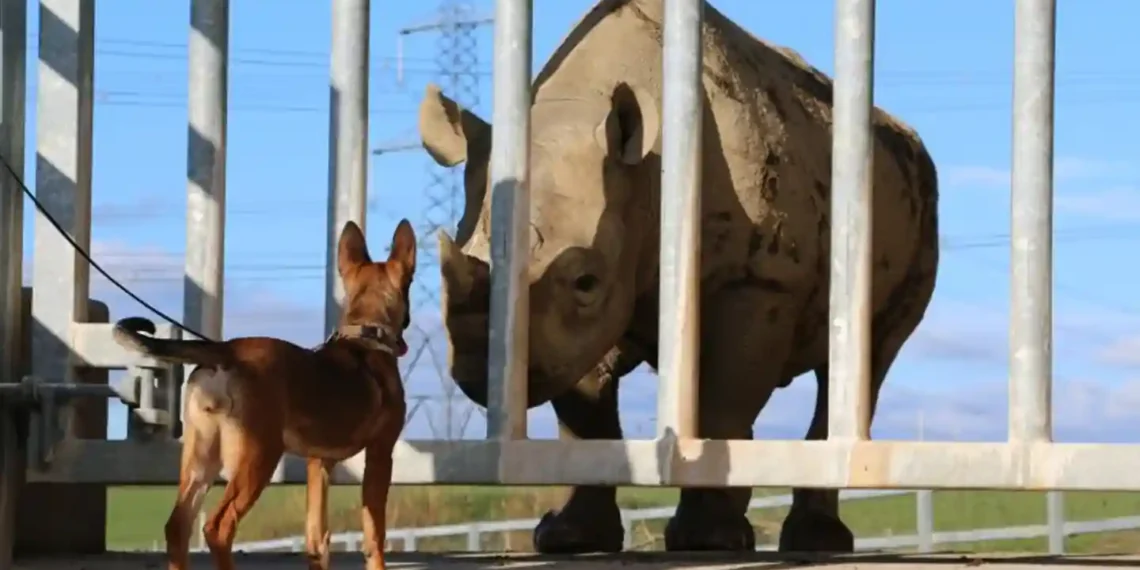Meet the Welsh Puppies Saving Africa’s Wildlife from Poachers
In the heart of Africa’s vast wilderness, where rhinos, elephants, and countless other species face the constant threat of poaching, a group of trained puppies from Wales is making a life-saving difference.
It all starts in the quiet Welsh town of Carmarthen, home to the non-profit organization Dogs4Wildlife. Here, expert trainers Darren Priddle and Jacqui Law have turned their passion for dogs and wildlife into a mission: to help protect endangered species across southern Africa. Their unique approach blends years of experience in training police and military dogs with a deep commitment to conservation.
“It was a horrifying image of a poached rhino we saw on social media that set us on this path,” Priddle recalls. “We knew we could use our skills to train dogs not just for security but for wildlife protection too.”
Since 2015, Dogs4Wildlife has sent 15 specially trained dogs to five African countries, including Mozambique and Tanzania. Their skills, especially in tracking poachers and detecting illegal wildlife products, have proven vital in the fight against poaching.
Training begins early for these pups—sometimes just two days old. Priddle and Law expose the puppies to a variety of smells, textures, and sounds, helping them develop the sharp instincts they’ll need as tracking dogs. The breeds they work with, such as Belgian Malinois and Dutch Shepherds, are known for their strong sense of smell and agility, essential traits for locating poachers or detecting rhino horns and ivory.
At around 16 to 18 months old, the dogs are ready for the next step: a flight to Africa to join anti-poaching units (APUs) working on the front lines of conservation. For Priddle and Law, saying goodbye to the dogs is always emotional, but they know these puppies will play a critical role in protecting wildlife.
“Letting them go is hard,” says Law. “But we know they’re going for the greater good.”
The dogs’ impact is undeniable. Take Shinga, a Belgian Malinois trained by Dogs4Wildlife. Last October, Shinga was part of a team that tracked down a poacher who had killed a warthog in Zimbabwe’s Imire Rhino and Wildlife Conservancy. Using his keen sense of smell, Shinga retraced the poacher’s route over a 2.8-mile (4.5-kilometer) stretch, leading the anti-poaching unit directly to his doorstep.
Such successes are common. In 2013, a dog named Dan alerted his team to a rhino calf trapped in a snare in South Africa’s KwaZulu-Natal province. The use of these dogs has brought a level of versatility and unpredictability to anti-poaching efforts, allowing rangers to track poachers even in darkness.
“The dogs allow us to ‘own the night,’” says Reilly Travers, park manager at Imire. “They’ve saved lives and helped us apprehend poachers. The difference they’ve made in security is huge.”
In reserves like Imire, the dogs have become integral to anti-poaching operations. They’ve been instrumental in a significant drop in poaching incidents, adding a powerful deterrent to would-be criminals.
“Once a poacher knows there’s a specialized dog team on the reserve, word spreads quickly, and poaching levels drop dramatically,” Priddle explains.
While the presence of these dogs doesn’t eliminate poaching entirely, it significantly improves the chances of capturing criminals and protecting endangered species.
As much as the dogs’ success is a triumph, the underlying problem—poaching—remains a severe threat. Zimbabwe, once home to thousands of rhinos, saw numbers drop drastically due to poaching. Although rhino populations have slightly rebounded, the continent still faces the grim reality of poaching, with over 600 rhinos killed in 2023 alone.
But Dogs4Wildlife isn’t just focused on dogs; it’s also deeply involved in wildlife education, particularly for local communities. Through its Siyafunda Ngemvelo program, which means “we learn in nature” in IsiZulu, the organization is educating South African children about the importance of wildlife conservation. The goal is simple: by teaching young people the value of animals like rhinos, the hope is they will become the next generation of rangers, not poachers.
For Priddle and Law, the success of their dogs represents just one part of the bigger picture. They aim to open a specialized training facility in Africa, which will allow future generations of conservationists to have the tools they need to protect the continent’s wildlife.
As the fight against poaching continues, these Welsh puppies are proving that sometimes, the best way to stop a poacher is with a dog’s keen nose and unyielding dedication.
The partnership between these loyal canines and the human teams fighting to protect Africa’s wildlife is more than just a success story—it’s a symbol of hope for the future of endangered species.
This article was rewritten by JournosNews.com based on verified reporting from trusted sources. The content has been independently reviewed, fact-checked, and edited for accuracy, neutrality, tone, and global readability in accordance with Google News and AdSense standards.
All opinions, quotes, or statements from contributors, experts, or sourced organizations do not necessarily reflect the views of JournosNews.com. JournosNews.com maintains full editorial independence from any external funders, sponsors, or organizations.
Stay informed with JournosNews.com — your trusted source for verified global reporting and in-depth analysis. Follow us on Google News, BlueSky, and X for real-time updates.













